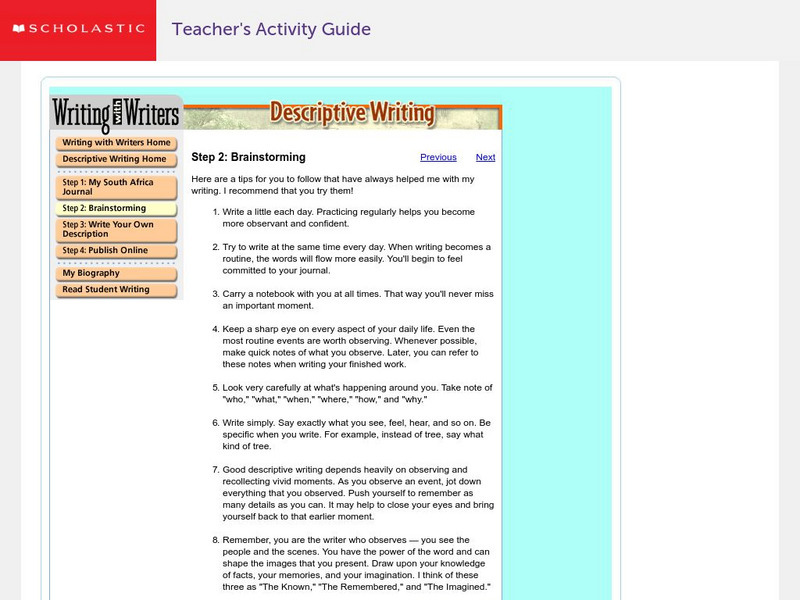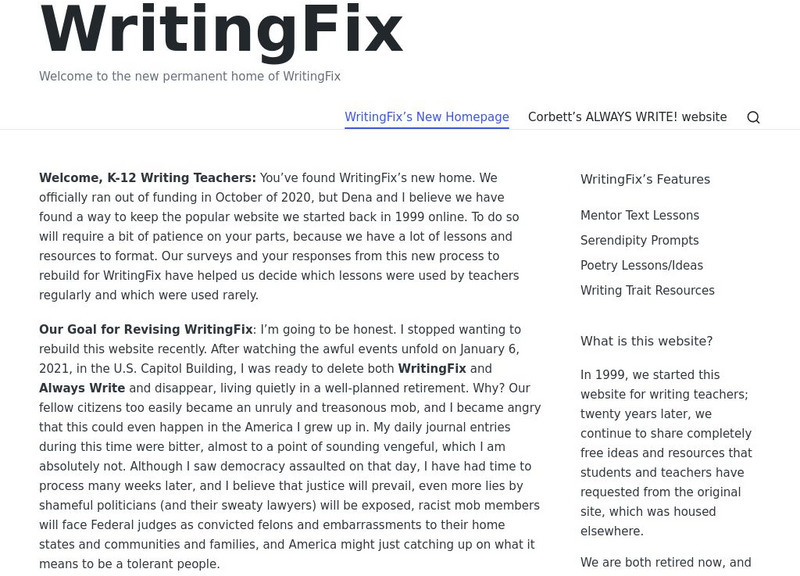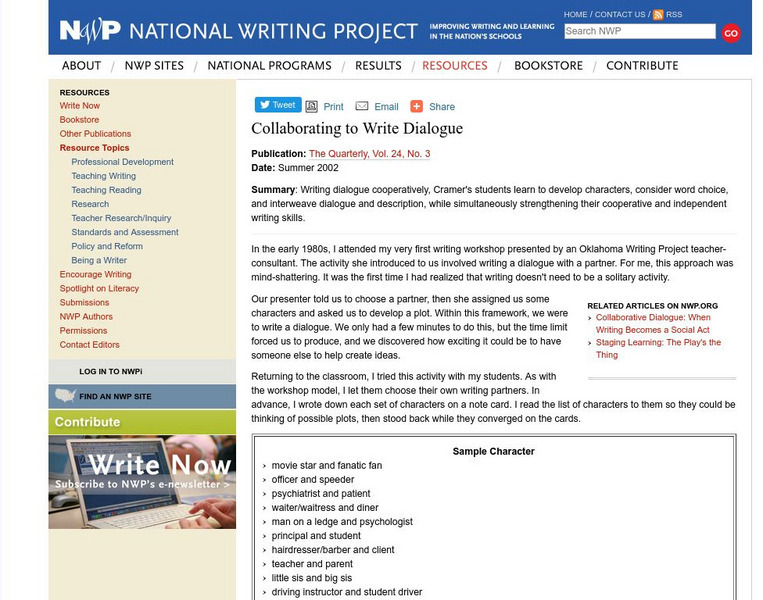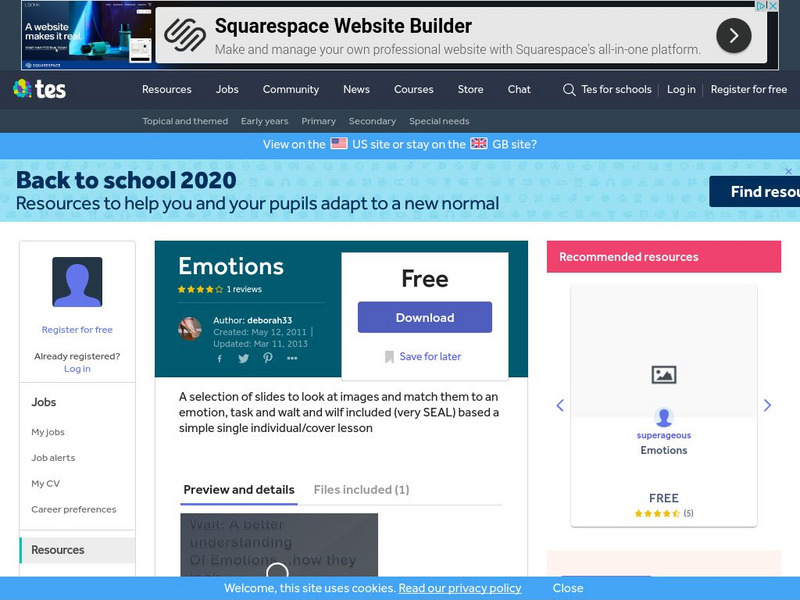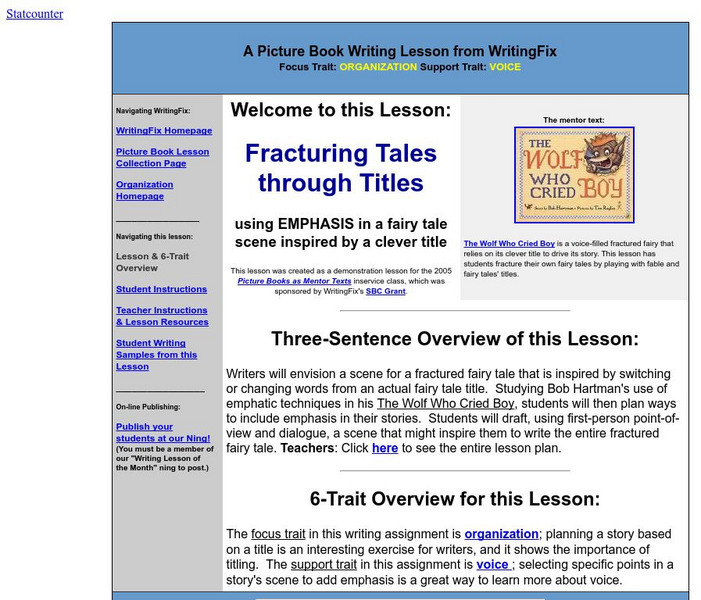Curated OER
Picture a Character
How would Jean-Etiénne Liotard paint the characters from "The Little Mermaid?" What would the main character from "The Little Match Girl" look like from Francisco José de Goya y Lucientes' point of view? After examining various paintings...
Read Works
Protagonist
Teach your class how to identify the protagonist in a story. The plan suggests starting with a protagonist from a tale you have previously read in class. Then, you can read a new story and work together to identify the protagonist,...
Read Works
Climax of a Story
Demonstrate how to track the elements of plot in a story. After watching you mark down the rising action, problem, climax, falling action, and resolution for Stone Soup by Jon J. Muth, pupils complete a graphic organizer for Sweet...
Curated OER
A Story of Philanthropy
Help your class define philanthropy and recognize philanthropic activities. Ask them to identify examples of philanthropy in literature and explore the philanthropic deeds of themselves and others. To wrap up, create a class display with...
Curated OER
Back to the Farm
Read up on farming and ranching and connect this information to your learners' lives. After reading, send class members home to fill out a family tree and trace their family history, focusing on farming and ranching backgrounds. Once...
Scholastic
Scholastic: Writing With Writers: Descriptive Writing
Need help with doing a descriptive paper or personal narrative? Need a writing lesson plan? Meet Virginia Hamilton and follow her step-by-step guide to writing. When done, you are eligible for a certificate signed by this author.
Writing Fix
Writing Fix: Writing Fix Homepage
Have you ever needed someone to help you out with your writing? This site offers help to students and teachers. The lessons and resources are organized based on the 6 Writing Traits model. An especially interesting feature of the site is...
Other
National Writing Project: Collaborating to Write Dialogue
In this lesson, writing partners work together to develop a plot and characters. The lesson emphasizes the use of dialogue to develop the characters and plot of the story.
TES Global
Tes: Emotions
[Free Registration/Login Required] This PowerPoint presentation contains art pieces that deal with different emotions. Students will analyze the art pieces and the associated emotions.
Annenberg Foundation
Annenberg Learner: Interactives: Elements of a Story
Explore the elements of a story using the well-known Cinderella story as source material. Learn about setting, character, sequence, exposition, conflict, climax, and resolution.
Annenberg Foundation
Annenberg Learner: Literature: Describing Setting
Short explanation of setting as a literary term. Written in the context of "What makes a good short story?" A link at the bottom of the page leads to additional information about setting.
Annenberg Foundation
Annenberg Learner: Elements of a Story Interactive
Explore different ingredients, or elements, that go into stories and make them so much fun. Read the story, "Cinderella," and look at all the different pieces of the tale to see how they all fit together.
Other
Storyboard That
Create your own storyboard with this interactive tool. The storyboard framework is a graphic organizer that helps structure students work into a linear and concise story. Although it feels easy at first, breaking down ones thoughts into...
PBS
Pbs Learning Media: Storytelling With Words and Pictures
In this interactive activity, students learn the basics of how stories are structured, gain vocabulary about storytelling elements, and explore how the arts, specifically drawing, can be a valuable way for students to tell stories.By the...
Utah Education Network
Uen: Create a Book (Grade 3 6)
Students will illustrate and write their own story.
Ted Nellen
Cyber English (By Ted Nellen): Characterization
This is a glossary entry for the term "Characterization" including a definition and the characteristics to be developed: Character's appearance, actions, thoughts, voice, and reaction from others.
Writing Fix
Writing Fix: 5th Grade Narrative Prompt: School Scenes in "Slow Motion"
This exercise was designed to serve as a pre-writing activity for one of their three designated fifth grade practice prompts for the state writing exam. The prompt is: Think about a time when something special or unusual happened at...
Writing Fix
Writing Fix: Fracturing Tales Through Titles
Learners read The Wolf Who Cried Boy by Bob Hartman and then write their own fractured fairy tales using first-person point of view and dialogue. Teacher and student instructions are provided along with student writing samples, an...
Writing Fix
Writing Fix: Action Words Bring Life to Setting Details [Pdf]
Students learn how to develop their ideas through description and action words through a story scavenger hunt. [PDF]
E Reading Worksheets
E Reading Worksheets: Setting Worksheets
In this learning module, students will study the concept of setting in literary text. Worksheets and PowerPoint lessons are provided to help students practice with finding "settings" and then citing reasons that support their answers.
Curated OER
Mc Graw Hill: Part 1 Reading Literature: Folktale
Understand how to read and find the message the exist in a story. Learn how folktales include messages in their stories.
Curated OER
Mc Graw Hill: 4th Grade Use Details and Examples
When reading a story learn how to recall specific examples from the text to answer comprehension questions. In addition, you can also use story details to make inferences.
Curated OER
Mc Graw Hill: Part 1 Reading: Literature: Describe Characters
A reference guide on how to analyze characters in a story.
Curated OER
Mc Graw Hill: Part 1 Reading: Literature: Describe a Setting
Do you know how to find the setting of a story? Learn how to find the when and where a story took place on this site.





